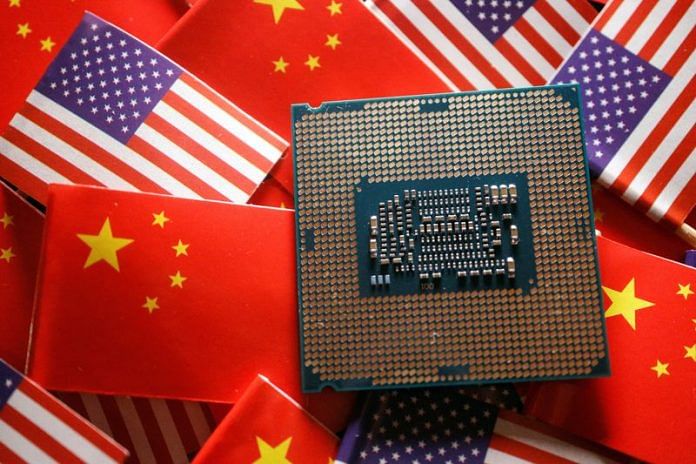By Andrea Shalal, David Lawder and Karen Freifeld
WASHINGTON/NEW YORK(Reuters) -The United States on Friday issued what it described as targeted draft rules for banning or requiring notification of certain U.S. investments in artificial intelligence and other technology sectors in China that could threaten U.S. national security.
The U.S. Treasury Department published the proposed rules and a raft of exceptions after an initial comment period following an executive order signed by President Joe Biden last August. The rules put the onus on U.S. individuals and companies to determine which transactions will be restricted or banned.
Public comments will be accepted until Aug. 4, which means the U.S. is on track to implement regulations by the end of the year as anticipated.
Biden’s executive order, which directed regulation of certain U.S. investments in semiconductors and microelectronics, quantum computing and artificial intelligence, is part of a broader push to prevent U.S. know-how helping the Chinese to develop sophisticated technology and dominate global markets.
“This proposed rule advances our national security by preventing the many benefits certain U.S. investments provide —beyond just capital — from supporting the development of sensitive technologies in countries that may use them to threaten our national security,” said Treasury Assistant Secretary for Investment Security Paul Rosen.
Treasury said the new rules were intended to implement “a narrow and targeted national security program” focused on certain outbound investments in countries of concern.
Treasury had mapped out the contours of the proposed rules in August. Friday’s news includes additional exceptions, including for transactions deemed to be in the U.S. national interest.
The proposed rules would ban transactions in AI for certain end uses, and involving systems trained in using a specified quantity of computing power, but would also require notification of transactions related to the development of AI systems or semiconductors not otherwise prohibited.
FOCUS ON CHINA, MACAU AND HONG KONG
Other exceptions would apply to publicly traded securities, such as index funds or mutual funds; certain limited partnership investments; buyouts of country of concern ownership; transactions between a U.S. parent company and a majority-controlled subsidiary; binding commitments that pre-date the order; and certain syndicated debt financings.
Certain third-country transactions determined to be addressing national security concerns, or in which the third country adequately addressed the national security concerns, could also be exempted, Treasury said.
The order focuses initially on China, Macau and Hong Kong, but U.S. officials have said it could be widened later.
Former Treasury official Laura Black, a lawyer at Akin Gump in Washington, said Treasury was attempting to define the scope of the rule as narrowly as possible, but it would require increased vigilance by companies seeking to invest in China.
“U.S. investors will need to engage in more extensive due diligence when making investments in China or investments involving Chinese companies that operate in the covered sectors,” she said.
Black said Treasury’s proposed rules were keeping U.S.-managed private equity and venture capital funds in the cross-hairs, as well as some U.S. limited partners’ investments in foreign managed funds and convertible debt.
Certain Chinese subsidiaries and parents will be covered under the rule, which would also prohibit some investments by U.S. companies in third countries, she added.
Besides equity investments, joint ventures and greenfield projects, default debt also could be captured when it becomes equity.
The regulations track restrictions on exporting certain technology to China, such as those barring shipment of certain advanced semiconductors.
The goal is to prevent U.S. funds from helping China develop its own capabilities in those areas to modernize its military.
Those who violate the rules could be subject to both criminal and civil penalties, and investments could be unwound.
(Reporting by Andrea Shalal and David Lawder in Washington and Karen Freifeld in New York; editing by Chris Sanders, Chizu Nomiyama and Kevin Liffey)
Disclaimer: This report is auto generated from the Reuters news service. ThePrint holds no responsibilty for its content.



